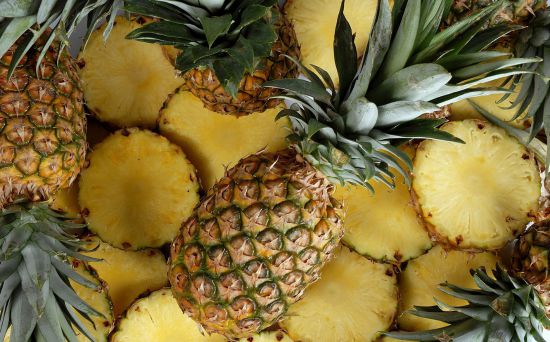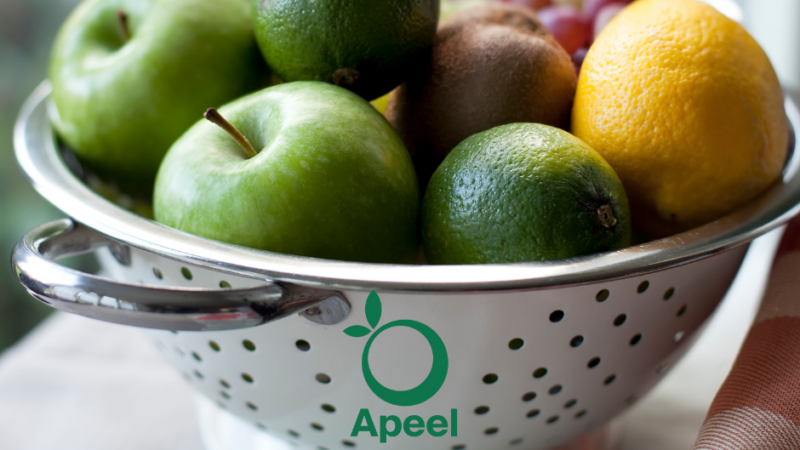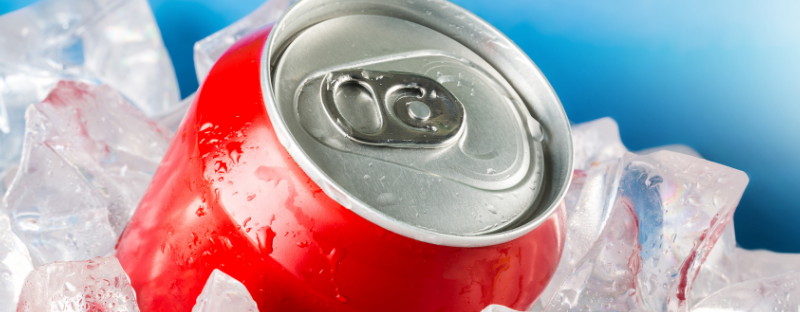17 Amazing Benefits of Pineapples

Pineapples are delicious tropical fruits, which have been celebrated for centuries not only for their unique taste but also for their miraculous health benefits. Eat a cup of pineapple chunks to reap its amazing benefits, such as boosting immunity, improving bone and eye health, and aiding in digestion. It is also anti-inflammatory in nature and helps in curing coughs and colds and accelerating weight loss.
90 percent of conventional pineapples had no detectable pesticide residues you don’t have to pick up an organic pineapple it’s on the clean 15 list from EWG.
What is Pineapple?
Pineapple, also known as ananas, is a delicious tropical fruit surrounded by thorny spikes and topped with hard, waxy leaves that are sometimes up to thirty per fruit. The fruit is up to a foot long and has a combination of sweet and tart taste. Pineapple belongs to the Bromeliaceae family and is actually a composite fruit made of coalesced berries that grow at the crown of a fruiting tree. The name pineapple evolved in the 17th century due to its structure and appearance being similar to pine cones.
Pineapples are a storehouse of several health benefits due to their nutrients. They contain bromelain, protein, carbohydrates, sugar, and soluble and insoluble dietary fiber. The vitamins in these fruits include vitamin A, vitamin C, beta-carotene, thiamin, vitamin B5 (pantothenic acid), vitamin B6, and folate. Minerals like potassium, copper, manganese, calcium, sodium, and magnesium are also found in pineapples. These tropical fruits are low in calories and are, therefore, a major part of weight loss diets.
Pineapple Uses
The fruit can be added to your daily diet in many forms, most commonly by cutting them into pineapple chunks to snack on! Crushed pineapple can also be added to cupcakes, cookies, bars, ice creams, yogurt, and various other desserts. Fresh pineapple juice or smoothie is another popular and delicious way to start your day. Its antioxidant-rich juice is also enjoyed around the world as the tropical drink, pina colada.
Pineapple leaves are used as wallpaper and in ceiling insulation. Pineapple fragrance oils are also popular due to their tropical touch.1
Health Benefits of Pineapple
The pineapple fruit is known to offer several benefits. Let us discuss each benefit in detail below.
Boosts Immunity
Pineapple is rich in vitamin C, which makes it one of the richest sources of ascorbic acid. Vitamin C helps in reducing illnesses and boosting the immune system by stimulating the activity of white blood cells and acting as an antioxidant to defend against the harmful effects of free radicals.
Improves Bone Health
Pineapple contains an impressive amount of manganese. Manganese is a trace mineral essential for the strengthening of bones as well as their growth and repair, as well as the creation and activation of certain enzymes. This is according to a report on the nutritional value and benefits of pineapple published in the International Journal of Nutrition and Food Sciences. A single serving of the tropical fruit can provide you with more than 70% of your daily requirement of this mineral.
Treats Cough and Cold
Pineapple is rich in both bromelain and vitamin C, therefore it helps in preventing and treating respiratory illnesses while eliminating phlegm and mucus from your body if you’ve already contracted an illness or infection. These two nutrients are connected with the reduction of phlegm and mucus build up in the respiratory tracts and sinus cavities.
In order to check the impact of pineapple on immunity levels, almost 100 children were fed no fruit, some fruit, and lots of fruit daily in a nine-week study. Children who ate pineapple showed a lower risk of viral infections and children who the most had almost four times more white blood cells than the other two groups. This clearly shows that consuming pineapple daily is positively linked to increased immunity levels.
Have you ever heard of drinking pineapple juice to alleviate your cough? It works!
On top of containing tons of illness-fighting vitamin C, pineapples have bromelain, an enzyme with anti-inflammatory properties. This combination of nutrients helps to fight off disease and kill bacteria, including those found in your throat! In fact, research has found that raw extracts from pineapple could decrease mucus five times faster than over-the-counter cough syrups.
What kinds of coughs can it help?
Pineapple juice can treat most persistent coughs, as long as they aren’t from something more serious like pneumonia. If you have a cold, skip the cough syrup and go straight for pineapple juice. It’s less expensive, healthier, and tastes much better.
Relieves Asthma
Pineapple aids in reducing the symptoms of asthma. It contains essential nutrients like vitamin C, bromelain, and beta-carotene, which help reduce inflammation often faced by asthmatics.
How to Pick a Pineapple?
The ripeness and freshness of a pineapple can be determined by the smell if its base (no matter how green the crown is). Pick a pineapple, the base of which smells sweet, just like pineapple juice. A fragrance-free pineapple is either harvested too early or is not sweet as it should be.
Note: If you are planning to consume a pineapple, cut the crown and keep the fruit in the fridge placing it upside down. Generally, the sweetness settles at the bottom of the fruit and this will help in distributing it throughout the pineapple. It’s best to have pineapple slices when it’s fresh so as to get maximum nutrition from it.
- https://www.ncbi.nlm.nih.gov/pmc/articles/PMC3529416/
- http://www.sciencedirect.com/science/article/pii/S0963996910004801
- http://nopr.niscair.res.in/handle/123456789/5694
- http://www.jpma.org.pk/full_article_text.php?article_id=8055
- https://www.ncbi.nlm.nih.gov/pubmed/24123777
- https://www.ncbi.nlm.nih.gov/pubmed/23620673
- http://onlinelibrary.wiley.com/doi/10.1002/mame.200400132/abstract
- http://iv.iiarjournals.org/content/19/2/417.short
- http://ajcn.nutrition.org/content/76/1/245.short
- https://www.ncbi.nlm.nih.gov/pmc/articles/PMC437620/
- http://article.sciencepublishinggroup.com/pdf/10.11648.j.ijnfs.20150401.22.pdf
- http://jamanetwork.com/journals/jamaophthalmology/article-abstract/416232
- http://ebm.sagepub.com/content/140/3/820.short
- http://www.jbc.org/content/82/2/465.short
- https://www.youtube.com/watch?v=3-z6PiCTA-o
- http://pubs.acs.org/doi/abs/10.1021/jf60227a026?journalCode=jafcau&
- http://onlinelibrary.wiley.com/doi/10.1111/j.1749-6632.1975.tb29287.x/abstract
- https://www.ncbi.nlm.nih.gov/pubmed/25505983/
Report Error in this Article







